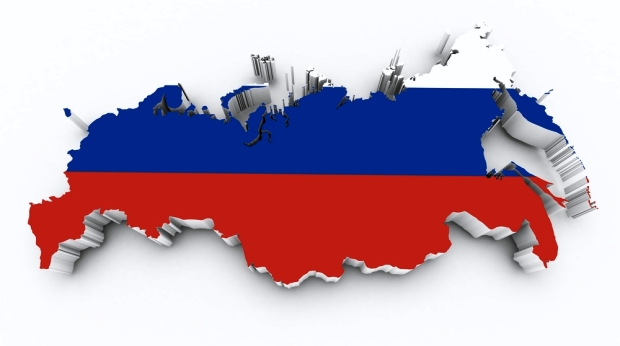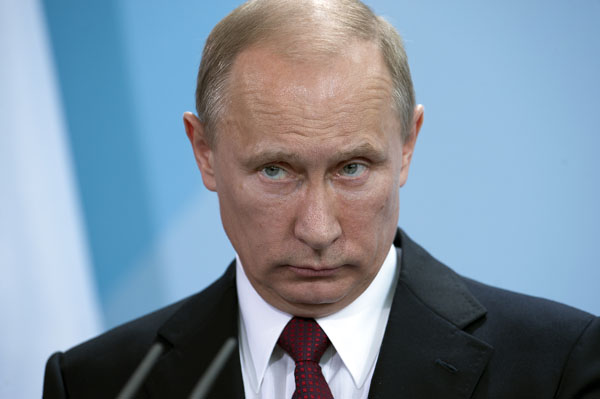9 Sep 2013 | Religion and Culture, Russia

A criminal case has been opened against American band the Bloodhound Gang in Russia, after bassist Jared Hannegan shoved a Russian flag down his trousers at a concert in Ukraine.
Russian Investigative Committee spokesman Vladimir Markin said: “A criminal case has been opened against James Moyer, Jared Victor Hennegan and other unidentified persons on counts of inciting enmity and humiliating human dignity.”
The band are accused of desecration of the Russian flag, which is illegal under Article 329 of the Russian Criminal Code and is punishable by up to a year in prison.
The incident took place on 31 July during the band’s gig in Odessa, Ukraine. They have already been banned from entering Ukraine for five years after a similar stunt involving the Ukrainian flag at an earlier concert in Kiev. They faced charges of hooliganism and desecration of state symbols.
The band’s concert at the Kubana festival in the Krasnodar region of Russia was cancelled by Culture Minister Vladimir Medinsky. They were also attacked in the lounge at Russia’s Anapa airport by local activists.
“I find the actions of Bloodhound Gang disgusting. I also condemn the act of violence against them,” American ambassador Michael McFaul tweeted at the time.
“Any artist, who wants to come and visit us, should understand that it is not just appropriate to respect the laws of their own country when they are at home, but Russian laws when they are in Russia,” State Duma Foreign Affairs Committee Chairman Alexei Pushkov said in a statement at the time.
Hannegan has reportedly apologised for the incident, explaining that they didn’t mean to cause offense and that it was simply part of a band tradition that items thrown on stage go through the bassist’s trousers.
6 Sep 2013 | News, Russia

Image Gonçalo Silva/Demotix
Russian president Vladimir Putin hit the headlines around the world after an interview with the Russian First Channel and the Associated Press on 4 September. His statements on Syria were given much attention, with early reports saying it meant Russia might support military intervention. In fact, Putin did not state that clearly, but pegged it to “conclusive evidence of the use of chemical weapons” by the Assad regime.
Close consideration of Putin’s recent public statements shows the same approach applied to other topics, including several human rights issues that Russia has been criticised about lately. Despite a noticeable change of the tone he prefers to give vague comments rather than well-articulated attitudes.
For instance, his reply to criticism on the law that bans “homosexual propaganda” was aimed to show Putin is tolerant to representatives of LGBT community, all the while referring to them as “such people”.
“I work with such people; sometimes I award them with medals and orders, we have absolutely normal relations, and I see nothing special about it,” said Putin in the interview without going into details on who “such people” are and what kind of “work” with Russia’s president they are involved in.
The same seemingly pleasant, but otherwise void impression was given by Putin during his meeting with a presidential Council on Development of Civil Society and Human Rights. During the meeting on 4 September Vladimir Putin put aside his macho-style image of a firm ruler.
“He suddenly appeared to be a different person, a constructive and attentive politician who is open to ideas and ready to consider them,” Andrey Yurov, a Russian human rights defender who is a member of the Council told Index. “He was listening carefully to suggestions about reforming of penal and judiciary systems, adjustments to internet regulations and public control of the state bodies, and reacted with comments like ‘Oh, this is interesting’, ‘We really need to look into that’ or ‘We might need to create a working group on this’. He did not say ‘yes, we will definitely do it’ to any of our suggestions, but at least he did not say a firm ‘no, we won’t do it’ to anything.”
Vladimir Putin even admitted the notorious NGO “foreign agents” law might need to be re-assessed. The law, adopted a year ago, forced all non-governmental organisations that receive funds from abroad to register as “foreign agents” if they are involved in “political activities”. The problem with the law, as many experts and civil society groups have pointed out, is its extremely broad definition of what constitutes a political activity. During the meeting with human rights defenders President Putin said it might be re-defined and narrowed.
“It is difficult to say if it marks a reboot of an attitude of the state towards the civil society and whether any real steps are to follow. But it was a constructive conversation between a rational politician and civil society. Perhaps it has to do with the G20 summit in St. Petersburg; Putin needs to show he is an open leader and he is in touch with civil society of his country,” recons Andrey Yurov.
Yury Dzibladze, the president of the Centre for the Development of Democracy and Human Rights, does not believe Putin’s statement signal any change.
“There are no signs of real improvement of the situation with human rights and civic freedoms inside the country. Criminal cases against political opponents are on-going; inspections of NGOs in line with the ‘foreign agents’ law continue. The rhetoric might change, but it only means the authorities want to improve their image abroad, not alter the situation in Russia itself. It might be connected with the G20 summit and up-coming winter Olympics they do not want foreign politicians to boycott,” said Yuri Dzhibladze.
23 Aug 2013 | Campaigns
Index on censorship has called upon the G20 countries to put free speech on the agenda when they meet in Saint Petersburg, Russia for a summit on 5-6 September.
Index on Censorship Campaigns and Policy Director Marek Marczynski said:
“The G20 should not solely be about advancing economic development but also about advancing the human rights of citizens within the G20 and beyond. Following recent revelations about mass surveillance by the US, the UK and other countries, it is more important than ever that they clearly express their commitment to freedom of speech, the freedom of the media and individuals’ rights to privacy. The G20 should be on the forefront of protecting those rights and freedoms in their own countries and globally.”
Files leaked by whistleblower Edward Snowden have revealed the extent of surveillance by the NSA in the US and GCHQ in the UK. It is time for the G20 leaders to be transparent about the activities they carry out in the name of national security and consider the impact that they have on their citizens. Any measures to restrict freedom of speech, privacy and other human rights in the name of the fight against terrorism should be within the permissible legal limits. They can only be justified if they are necessary in a democratic society.
In the lead up to the summit, Index has been publishing articles exploring the free expression records of some of the G20 nations. The ongoing series can be found here.
23 Aug 2013 | Campaigns
Британская организация «Индекс цензуры» (Index on Сensorship) обратилась к лидерам стран «Группы двадцати» (G20) с призывом обсудить ситуацию со свободой слова во время их саммита в Санкт-Петербурге 5-6 сентября.
«“Большая двадцатка” должна обращать внимание не только на вопросы экономического развития, но и на ситуацию с правами человека в этих двадцати странах и за их пределами. Учитывая недавно опубликованные материалы о массовой слежке, которую проводят США, Великобритания и некоторые другие страны, как никогда важно, чтобы правительства этих государств четко сформулировали свою приверженность свободе слова, свободе СМИ и права граждан на частную жизнь. “Группа двадцати” должна находиться на переднем крае борьбы за соблюдение этих прав и свобод в своих странах и по всему миру», – заявил директор кампаний и полиси «Индекса цензуры» Марек Марчиньски.
Файлы, преданные огласке Эдвардом Сноуденом, засвидетельствовали масштабы слежки, проводимой Агентством национальной безопасности США и Штабом правительственной связи (GCHQ) Великобритании.
«Пришло время всем лидерам “Группы двадцати” открыто заявить о деятельности, которую они проводят в целях национальной безопасности, и оценить последствия этих действий для их граждан. Любые меры, которые ограничивают свободу слова, право на частную жизнь и другие права человека во имя борьбы с терроризмом, должны приниматься строго в рамках законодательства и в любом демократическом государстве могут быть оправданы только крайней необходимостью», – говорится в заявлении «Индекса цензуры».
В преддверии саммита «Группы двадцати» «Индекс цензуры» также подготовил серию аналитических материалов о ситуации со свободой слова в странах «Большой двадцатки». Материалы серии доступны здесь.


